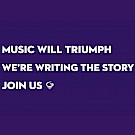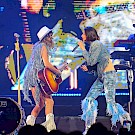 Blonde Redhead at the Wonder Ballroom—click to see more photos by Sam GehrkeAt a recent music marketing meetup in Portland, a panel of area concert promoters shared the stage to discuss and answer questions about the local music business and how artists can promote themselves to venues and the general public. Moderated by Jason Fellman (of J-Fell Presents) and run in association with Mogo Music Festival and Vortex, the panel, dubbed the "Portland Concert Promotion Dream Team," consisted of promoters Mike Walker (Crystal Ballroom, McMenamins Music & Events), Frank Rinaldi (Doug Fir Lounge) and Ned Failing (Pickathon, Revolution Hall, Mississippi Studios). Between the three of them, they represent some of the most revered venues in the city, as well as a number of festivals and other annual music events.
Blonde Redhead at the Wonder Ballroom—click to see more photos by Sam GehrkeAt a recent music marketing meetup in Portland, a panel of area concert promoters shared the stage to discuss and answer questions about the local music business and how artists can promote themselves to venues and the general public. Moderated by Jason Fellman (of J-Fell Presents) and run in association with Mogo Music Festival and Vortex, the panel, dubbed the "Portland Concert Promotion Dream Team," consisted of promoters Mike Walker (Crystal Ballroom, McMenamins Music & Events), Frank Rinaldi (Doug Fir Lounge) and Ned Failing (Pickathon, Revolution Hall, Mississippi Studios). Between the three of them, they represent some of the most revered venues in the city, as well as a number of festivals and other annual music events.
Many valuable thoughts, tips and suggestions were shared during the three-hour session, but one particular nugget that jumped out came from Fellman, who is also the organizer and promoter of several successful concerts and festivals. Amidst a discussion on social media best practices, he looked at the musicians in the audience and urged: "Don't go dark between shows.”
Don't go dark?! What does that even mean? And what does that have to do with me and my band?
Easy. Consider the following scenario.
A local band books that big show at that cool venue in town. As the date draws nearer, the band members burst into action. A couple awesome images are shared online; a Facebook event page magically appears and starts getting promoted; everyone on everyone's friends lists are invited; fun little reminders about the upcoming show are tweeted daily.
Gig day comes and things are amazing! A multitude of fans turn out, the venue is ecstatic, tons of merch is purchased, and all is wonderful with the world.
Someone from the band pops on the Facebook event page the morning after and posts a huge: "Luv you guys SO much! Thank u for an uh-MAY-zing show at BlahBlahBlah!! emoticon, emoticon, emoticon"
That day passes, the next arrives and the buzz gradually mellows out a bit. Another day or two, and then… crickets. Nothing. The band has stopped hearing from anyone who was excited over the weekend and—far, far worse—those fans have stopped hearing from the band.
Sound familiar? Admit it. You and I have both done it.
But the show's over, you say. There's nothing to post about anymore. Time to book the next one so that we have something to blab about and can start the process all over again. Right?
Wrong.
What you've just done, as Fellman suggested above, is "gone dark." You just took all of that engagement with your audience that you'd been building and chucked it out the window.
 There are at least two reasons this is a bad move (but certainly more):
There are at least two reasons this is a bad move (but certainly more):
1. LOST OPPORTUNITY
As an artist, you want attention, right? You want people to know who you are, hear your music, like it, buy it and share it with others. Well, you had their attention and you let it go! Why would you do that? If you're not going to try to convert would-be fans into real fans, or sort-of fans into super fans, why did you even go to the trouble of promoting your show in the first place?
There's a lot of noise out there on the interwebs these days. If you're not staying in front of your audience, some other artist will be more than happy to take your place. And it'll be easy for them to do it because you're nowhere to be found at the moment. Remember the old saying: out of sight, out of mind. That rings very true here. Lost opportunity right there, my friend, lost opportunity.
2. ALGORITHMIC PURGATORY
How Facebook and other social networks calculate when and where posts get seen is truly anybody's guess. But many experts agree that the "out of sight, out of mind" adage is just as valid online as it is off. You and your band are exponentially more likely to have greater reach (meaning an increased chance of your posts being seen) if you're regularly active on any given platform.
Go dark—or disappear for long stretches—and it will be more difficult (and take more time) to build views and engagement back up. Take a long social media hiatus and that one-off "surprise, we've got a show" post you suddenly run might be met with near radio silence. Bummer indeed, but entirely your fault.
WHAT TO DO INSTEAD: THE 3 S's
Jazz drumming legend Art Blakey is quoted as having said, "If you're not appearing, you're disappearing." Let's not disappear between shows anymore, shall we? We can prevent this from happening by implementing what I call the 3 Social Media S's.
SAVE
Ever get a live recording from a show (perhaps a direct board feed from the sound engineer)? Photographer at last night's show just Dropbox you a pile of sweet images? Did mom capture your two new tunes on video?
If you're like most bands, you're excited to share all of this content with your peeps, so you upload it to SoundCloud, YouTube, etc., and blast a link to Facebook and Twitter. Don't. Slow down a bit. Share one (and only one) of those images, videos or audio clips, and get into the habit of saving the others to share on your slow—or no—content days. Rather than having one good blast that gets traffic for a short amount of time, you're storing up a backlog of goodies that can be slowly shared one by one. This amounts to your fans getting regular reminders of your existence, and you benefit from their regular engagement. On top of that, you keep the algorithm gods smiling, making them more than happy to help get eyeballs on those occasional super important gig postings.
 Jamie xx at the Wonder Ballroom—click to see more photos by Sam Gehrke
Jamie xx at the Wonder Ballroom—click to see more photos by Sam Gehrke
SCHEDULE
So you've saved all of that content for future use and now you have to constantly be on social media to share it? Ugh.
Not quite the case. Time to "set it and forget it." Using an online social media management tool such as Hootsuite or Buffer, we can create posts in advance, schedule them to be published automagically at any time we specify, and then sit back and relax while giving the illusion that we're all over the web.
Gather together all the links that you'd like to share and enter each into your scheduling software. Maybe sprinkle in a funny anecdote from that last road trip, peculiar band member fact, or gentle reminder to join your email list.
In minutes—and for free—you can have weeks (or months) worth of social media posts all set to go!
SOCIALIZE
Although the trick above allows us to step away and still seem relatively active, it's important to not become stagnant on social media. I hate perusing an artist's Twitter feed only to find that every single one of their tweets seems generic and auto-posted from a music platform like ReverbNation. Worse yet is when they have people @ mentioning them but there is never a response. That immediately screams either: a) I never log in here; or b) I'm too good to reply to friends and fans. Guaranteed unfollow.
I am in no way, shape or form saying that you need to be glued to your phone, lying in wait of the next instance your band is mentioned or messaged. But I am saying that it could perhaps behoove you to login and check once in a while. Better yet, take a cue from the way many businesses handle their social media: Give all of your band members the login details. That way, everyone can share the burden of posting and responding. Add an even more personal touch by having whoever makes a post "sign" it by including his or her initials at the end.
And, just in case this really needs to be said, respond to your damn messages, will ya? Be cool. Your current and potential fans will all appreciate it, and it will come back to you in the long run.
To summarize: Don't go dark.
Instead: Save. Schedule. Socialize. And, go!
Mark Powers is a Portland-based drummer, educator and author. Recent performance/recording credits include work with M. Ward, Haley Johnsen, Mbrascatu, Amanda Richards and Rob Wynia. For more, check out Powers Percussion.








